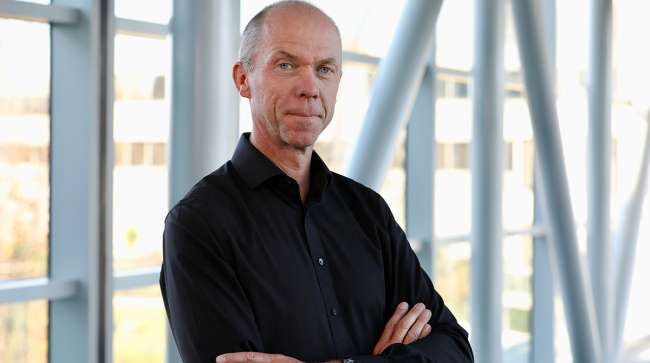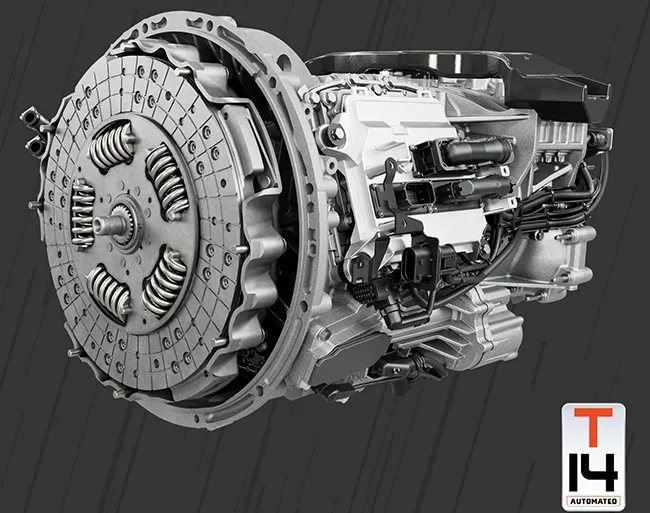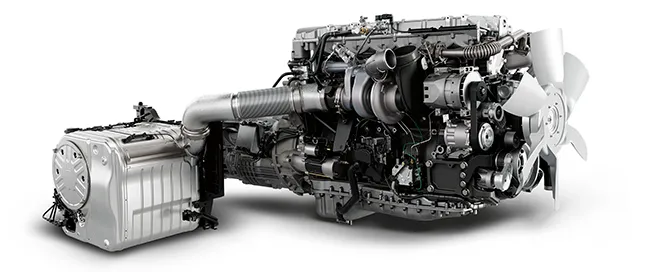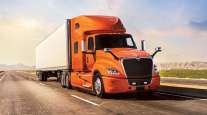Staff Reporter
International CEO Recaps Eventful Year

[Stay on top of transportation news: Get TTNews in your inbox.]
The leader of International Motors said an eventful year marked by key product launches for the truck and engine manufacturer was encapsulated by a corporate rebrand that he said helped define the company’s broader plans for its future.
“2024 has been a year of a lot of introductions for us,” International CEO Mathias Carlbaum said in an exclusive interview with Transport Topics. He pointed specifically to the rollout of an integrated powertrain that includes the company’s S13 engine line and T14 transmission on the heavy-duty side, its updated HV medium-duty model, and the series production launch of a its redesigned CE-series school bus, which is available with both diesel and all-electric power options.
“We started off with the new school bus really going into series production [and] scaling up the introduction of our driveline, the S13 and the T14,” he said. “There were a lot of — call it expectations — on starting to bring updated products to the market.”
The company had to overcome some hurdles along the way, Carlbaum noted. These included transitioning the bus plant over from one generation of product to the next, and contending with truck manufacturing delays after a factory fire at a rearview mirror supplier hampered the OEM’s ability to deliver new units to customers.

International rolled out the T14 transmission this year. (International Motors)
“Throughout all of that, we did feel confidence — backed up by our customers — that the products that were coming out were very well-received,” Carlbaum said. “Both the buses and our new driveline. We were working with a good cause to really work through those [disruptions] and get the products in the hands of our customers.”
To encapsulate those efforts, the company in September changed its name from Navistar to International Motors, reconnecting to a heritage that stretched back more than a century to when the company was known as International Harvester. The truck maker adopted the name Navistar International in 1986 to focus on its trucks after selling its agricultural equipment business.
Carlbaum noted the change also aims to advance the work the company has done to move past the controversial history of the MaxxForce 11- and 13-liter engine lineup, which previous management took to market with an exhaust gas recirculation emissions setup that, ultimately, had to be replaced with selective catalytic reduction. Navistar faced a federal class-action lawsuit in the wake of the MaxxForce engines’ performance, which it settled in 2019.

Powertrain for the S13 engine line. (International Motors)
Carlbaum stressed that releasing products and services that customers value has been an important step in moving forward, and that the September rebrand brought all of those efforts together.
“The way to move forward is to bring the right products and earn respect,” Carlbaum said. “No marketing or brand campaign will ever do that for you. My point is that having done this — initiating this journey of introducing an updated bus program, we have now updated our HX Series, we have brought the S13 and T14 to market — it is a moment to add branding on top of that.”
Lori Heino-Royer of Waabi discusses the latest developments, breakthroughs and key industry partnerships in autonomous trucking. Tune in above or by going to RoadSigns.ttnews.com.
Production activity for the new engine lineup at the company’s Alabama engine plant has been promising, Carlbaum said.
“Volumes are picking up month to month,” he said. “We tend to say that there is a 13-liter market out there, there is a 15-liter out there, and if you look into our stats, we’ve been very much underrepresented on the 13-liters. So, there’s growth potential for us there to better reflect what the market is.”
Carlbaum said order activity this year was in line with expectations, but he is also anticipating a substantial increase next year.
He also noted that the S13 is available with a biofuel setup, a reflection of an uncertain landscape as OEMs and fleets seek to comply with approaching emissions-reduction targets.
“Everything is needed,” Carlbaum said. “It is biofuels, it is electrical solutions, it’s more energy efficient engines overall. There is no silver bullet here, and what is important for us is just to have on hand the products that our customers will need in that journey. So, we have it certified now for biodiesel and look forward to that being a bigger part of the diesel consumption.”
Want more news? Listen to today's daily briefing above or go here for more info
In the U.S., Carlbaum said while the conclusion of the presidential election cycle should help ease some uncertainty for businesses, companies must still be poised to adapt to whatever changes come. He also believes a push toward more environmentally friendly operations will continue, even if the pace of regulatory change slows down.
“Whatever the timeline is, I think the long-term solution will be a less CO2-emitting transport sector,” Carlbaum said, “and we are going to bring the right technology to deliver on that. We have invested in it, we will adapt our time plans to what is needed. But over time, the zero-emission alternative will win.”





